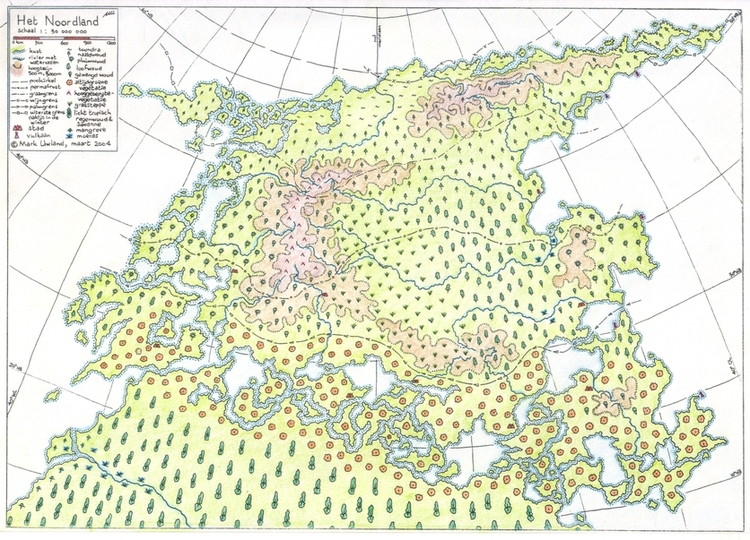 Caltura
Caltura
Caltura is a city in the south of the Northland (in Dutch: 'Noordland'). The name might mean something like 'the big belonging' (calor: 'big', tunerni: 'to belong'). It is the only municipal society by the Tharonsi. They also live in a number of small villages around Caltura, but the closest city is many days journey away, outside the area the Tharonsi live in. Caltura has city walls with three big entrance gates. Within the city walls amongst many other things there's wells and a large area with arable land. Around the central square there are a market place and a number of important public buildings like the tempels, the bath-house and the library.
The society of Caltura is divided into the classes of workers and nobility. The city is governed by a king or queen who is chosen by the nobility after the death (or abdication) of her or his predecessor. The monarch is chosen from all inhabitants of Caltura past the age of 30, but will mostly be chosen from the nobility. The nobility is made up of wise men, shamans, bards and other artists (of both sexes). The wise try to describe the true nature of the world, and they're the keepers of the rituals and the calendar. From their midst the monarch appoints judges, who administer justice in severe offences according to a written jurisdiction. Shamans control spiritual affairs and have knowlegde of healing powers, for instance in herbs. Bards and other artists with their stories shape the national identity, and they're the centre of attention during celebrations and parties. It is necessary that the number of wise men in the nobility of Caltura at all times equals the number of shamans and bards together. So for every shaman or bard being raised to the peerage (being appointed to the college that chooses the monarch), two wise men need to be raised to the peerage.
All other inhabitants of Caltura are a part of the working class: the farmers, the merchants, the civil servants and the artisans. There is no slavery. The arable land is owned by the society as a whole, just like the public buildings, and is being taken care of using tax-revenues. All feel responsibility for and involvement in the public buildings and the arable land.
Around the city Caltura apart from the Tharonsi also nomads and semi-settlers (the correct word in English may be peripatetic nomads) live. There's not a great deal of contact between the townsfolk and the nomads, but there is some trade between them. There is for instance barter trade of agricultural and other implements made in the city for wool, skins and meat.
In the religion in Caltura dreams play a central part. Shamans may help to explain the meaning of someone's dreams. Tharonsi regularly go on a dream-journey to follow their dreams, which in most cases help to enrich their spirituality. I'd guess people believe in the omnipresence of the gods, and that a number of the nomadic people outside the city believes in a continuous creation (in which people realise that the creation is still in progress and will probably never come to a halt).
Until two centuries ago Caltura was a part of the empire Barest, that had covered a large area around the strait of Altina. The empire was the largest that until then had existed in the Northland, but eventually it had grown too large to be governed effectively and it had fallen apart. Although almost all imperial institutions had perished in a period of migration of the nations, some of the basic ideas about politics and justice have managed to survive, for instance in Caltura.

Map of the Northland. Click to view a version of 924 KB.